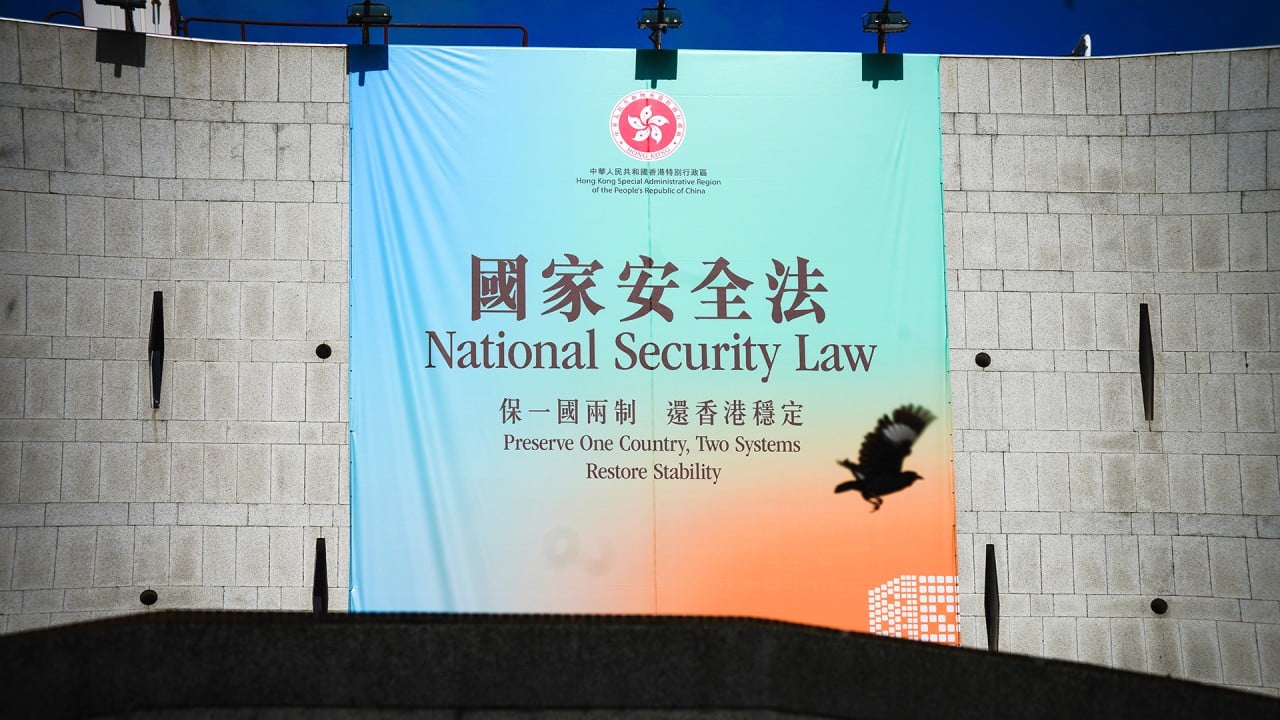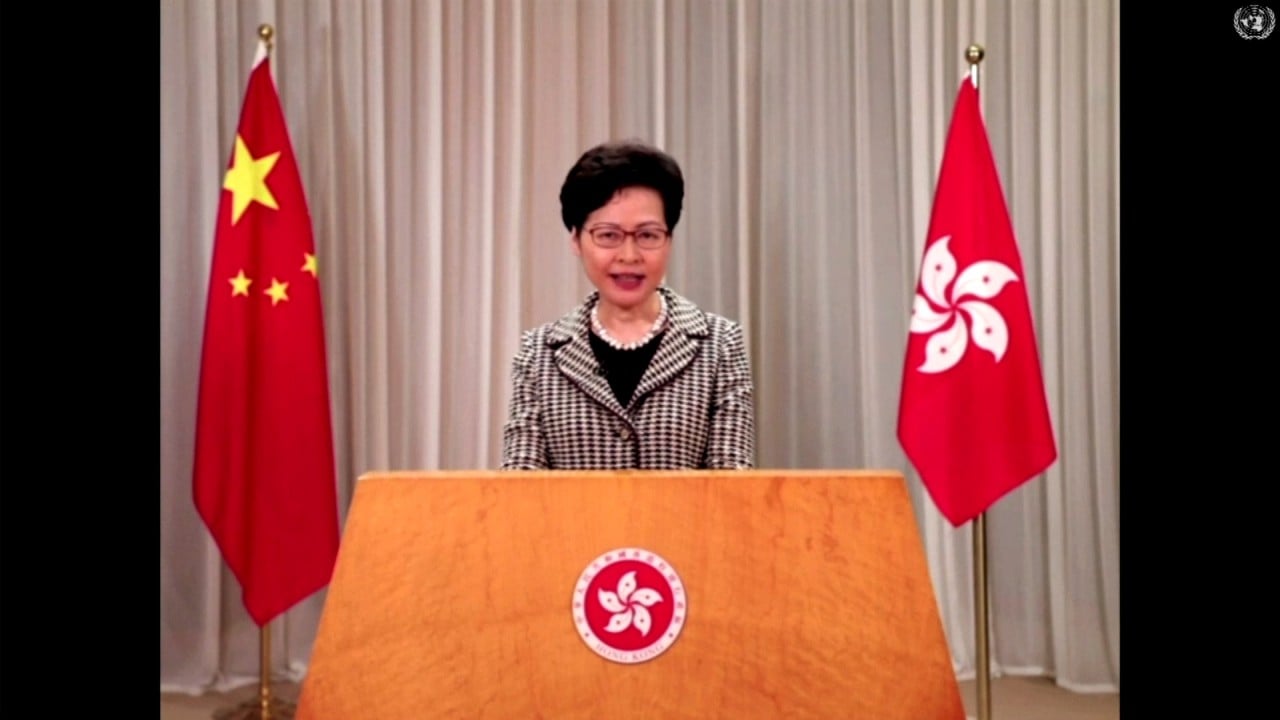
China vows to retaliate after US bans defence exports to Hong Kong over national security law
- Foreign ministry spokesman says national security law that prompted Washington’s move is purely an internal matter and other countries have no right to interfere
- Japan and South Korea join chorus of international concern, with Tokyo saying law will damage international confidence
US Secretary of State Mike Pompeo announced the restrictions on the eve of the top Chinese legislature’s formal endorsement of the new law, saying the US “can no longer distinguish between the export of controlled items to Hong Kong or to mainland China”.
“The Chinese Communist Party’s decision to eviscerate Hong Kong’s freedoms has forced the Trump administration to re-evaluate its policies toward the territory,” Pompeo said. The US “is forced to take this action to protect US national security”.
“Further actions to eliminate differential treatment are also being evaluated,” Ross said. “We urge Beijing to immediately reverse course and fulfil the promises it has made to the people of Hong Kong and the world.”
The announcements drew an immediate rebuke from Beijing, which vowed to retaliate if Washington moved to impose the restrictions. Foreign ministry spokesman Zhao Lijian said the national security legislation for Hong Kong was an internal matter for China and no foreign country had the right to intervene.
“In response to the mistaken US action, China will take necessary countermeasures to firmly defend our own national interests,” Zhao said. “Intimidating China will never work.”

03:33
Beijing passes national security law for Hong Kong
Other countries were swift to criticise the passage of the law.
Using one of the strongest terms in Tokyo’s diplomatic vocabulary, the Japanese government described the action as “regrettable”, saying the law would damage international confidence in the principle of “one country, two systems”, which has been applied to the former British colony since it was returned to Chinese control.
Chief cabinet secretary Yoshihide Suga said it was important for Hong Kong to be able to maintain its freedom and openness to prosper in a “democratic and stable way”.
Seoul also expressed concern over the impact of the law on economic exchanges between South Korea and Hong Kong, as well as the uncertainties over Hong Kong’s future autonomy.
“Hong Kong is an important entity that has close human and economic exchanges with us. The government is closely watching developments ... following the passage of the national security law,” foreign ministry spokesman Kim In-chul said.
Previously, Hong Kong had enjoyed special privileges that allowed it to import American defence equipment that Beijing did not have. It was also able to import dual-use technologies without the licences required when the same items were sold to mainland China.
Suspending export licence exemptions granted to Hong Kong, but not to mainland China, targets companies that import sensitive technologies to Hong Kong then re-export them to the mainland.

02:59
Carrie Lam defends national security law in speech to United Nations
Hong Kong Chief Executive Carrie Lam Cheng Yuet-ngor said the US sanctions did not mean a total ban on exports to Hong Kong. “It probably means importers need to acquire a licence, but the US government has to reveal more details,” Lam said.
The move could also be “a little bit inconvenient” for some businesses, such as those involving hi-tech products, she said, adding that she would discuss the issue with some Hong Kong universities that could be affected.
According to the Hong Kong government, dual-use goods include nuclear materials, facilities and equipment, electronics, computers, telecommunications, information security, sensors and lasers, navigation and avionics, marine, as well as aerospace and propulsion equipment.
Lento Yip Yuk-fai, chairman of the Hong Kong Internet Service Providers Association, said that in the long run Hong Kong might not be able to import some networking equipment, software and servers from the US.
“If we can’t get these hi-tech products, we could still look for alternatives from other countries. The problem is, the technology we use might not be advanced any more and the internet service might not be as efficient as now,” he said.

02:02
PLA’s Hong Kong garrison releases sniper tournament video as national security law nears approval
Wong Kam-fai, associate dean of the engineering faculty at Chinese University of Hong Kong, said he believed that the US’ export restrictions would have a limited impact on university research given the many substitutes available from the mainland and elsewhere in Asia.
“For some dual-use technologies such as 5G and GPS, there are already substitutes [from Chinese firms such as ZTE and Huawei],” Wong said.
“In the field of research, we should be open-minded. If it happens that there are not many substitutes for particular items, we can be open to source from elsewhere.”
Wong said the short-term impact on university research still depended on the range of the restrictions.
“I remain to be cautiously optimistic [about the new restrictions],” he said.
Lam Chiu-ying, former director of the Hong Kong Observatory, said the US was no longer the only source of supercomputers for weather forecasts.
“There will always be alternative sources. These days, many of the necessary materials are open source and publicly available online, these fallbacks may not be that much different,” he said. “There will always be a workaround.”
Additional reporting by Julian Ryall in Tokyo, Park Chan-kyong in Seoul and Denise Tsang, Lilian Cheng, Chan Ho-Him and Zoe Low



